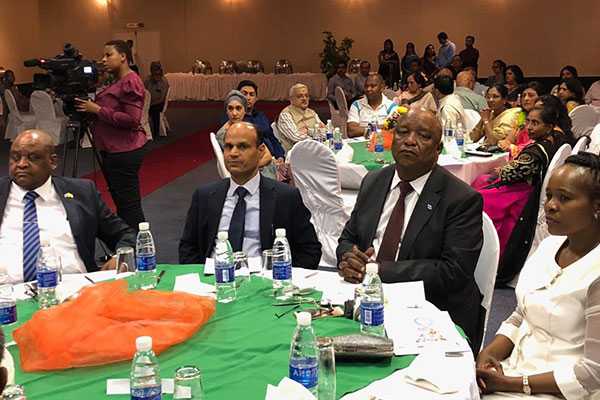Rich Indians dominate Botswana’s diamond sector
Indian companies have collectively invested several billion pulas into the Botswana economy and employ up to 10,000 citizens, says Manhar Mooney, the executive chairman of Trans Africa Group. The majority of these companies belong to the Gujaratis, such as the motor magnate, Satar Dada; Trans Africa’s Manhar Mooney; Motovac’s Harshad Patel and many others.
Speaking Monday this week during the celebration of Gujarat Day at the Maharaj Conference Centre, Mooney said the advent of Gujeratis into Botswana is almost a century old. Mooney arrived in Botswana around 1979/80 from Zimbabwe, where he was involved in the freedom struggle against Ian Smith’s white-minority rule with “my political leader, Joshua Nkomo” of the Zimbabwe African Peoples Union (ZAPU).
His father came to Beira Port (Mozambique) in 1917 (exactly 101 years ago), after a two-month journey on a small vessel from Bombay (now Mombai). He was 22 years old -just like Mahatma Ghandi who arrived in South Africa at the age of 23 as a qualified barrister to represent a Pretoria-based Gujerati Memon trader, in a court case. The first few Gujerati families arrived into Botswana, due to oppressive apartheid laws in South Africa.
They crossed into border villages like Ramotswa, Sikwane, Lobatse and others and moved on into other villages and towns as opportunities arose. “They assimilated into local communities and spoke the local languages fluently, providing services to these communities,” said Mooney. Mooney said that some Indian Gujerati businessmen then saw opportunities from neighbouring countries, as did some professionals from the accounting and medical fields from India, who descended upon Botswana.
Many were recruited into government service and senior positions. Today, the largest Indian population outside of India, Mooney said, is in the USA, then UK and then South Africa with Gujerati’s featuring prominently, mainly as traders. He said that in the USA, Gujeratis carry the label “Hotel – Motel – Patel” and that this is not by accident” but because they own 60 percent or more of the hospitality industry.
“They started buying up cheap low quality motels all over America. Their offspring have by now acquired some of the largest franchise hotels in the USA,” he said. Speaking at the same occasion on Monday, India’s High Commissioner to Botswana Dr. Rajesh Ranjan (incidentally also a Gujarati) called on Batswana businesspeople and Gujaratis resident in the country to participate in the VIBRANT GUJARAT GLOBAL SUMMIT 2019, which will be held at Gandhinagar, Gujarat in India from 18 to 20 January 2019.
Currently there are 19 operational Diamond Manufacturing Companies, out of which eight are of Indian origin, and together these companies employ 1000 young Batswana who have been trained in diamond cutting and polishing. Four of these companies – Dharmanandan, Mohit, Yaelstar and Karp Impex – were licensed in 2018.
Indeed, acceded minister Eric Molale, Botswana’s diamond sector is largely dominated by the Gujarati community whose 500 families resident in the country and have invested largely in the diamond and hospitality industries, infrastructure development, trading and various Small and Medium Enterprises. Among the world’s renowned Gujaratis are Mahatma Ghandi and the current Indian Prime Minister, Nahendra Modi.
In his keynote address, minister of mineral resources, green technology and energy security Molale, observed that Gujaratis are renowned for their mercantile ethos and business acumen, a trait accentuated by the executive chairman of Trans Africa Gorup, Manhar Mooney in his presentation on ‘the Journey from Gujarat to Botswana’ as innate to this enterprising group of people that originate in Gujarat, a state located on the west coast of India.
Dr. Ranjan extolled the significance of Vibrant Gujarat citing the 2017 event, which he said had more than 100 countries with more than 2700 international delegates participating including two Presidents from Africa – Kenya’s Uhuru Kenyatta and Rwanda’s Paul Kagame as well as Prime Ministers from Portugal and Serbia. The 2017 Summit was also attended by nine Nobel Laureates and also organised 355 business-to-business meetings and 260 business to government meetings.
“I would like to invite you all to participate in Vibrant Gujarat Global Summit 2019 to enhance the relationship between India and Botswana,” Dr. Ranjan appealed. Also in attendance on Monday at the Gujarat Day were Chairman of Botswana Investment and Trade Centre (BITC), Victor Senye.
He told Botswana Guardian that he would take up the High Commissioner’s invitation with his management, in light of the fact that Gujarat is classified as one of the leading industrialised states in India. Buttressing Gujarat’s commercial attributes, Dr. Ranjan emphasised that the state is one of the best places in India for the manufacturing of textiles, pharmaceuticals, and agro-based and petrochemical products. He cited among the major investors in the state, Adani, Clarins Paris, Ford, Honda, IBM and Kellogg’s.
In terms of economic performance he said that Gujarat recorded $66.8 bn worth of exports in 2017-18, contributing over 22 percent to India’s net exports and recorded $18, 7bn worth of foreign direct investment inflow from 2000 to 2018. Dr. Ranjan mentioned other attributes of Gujarat as the host to the world’s largest petroleum refining hub at Jamnagar and the world’s third largest producer of denim as well as a global leader in processed diamonds.
All these make for fine selling points to induce BITC. Other speakers at Monday’s Gujarat Day included Arjav Mehta of Arjav Diamonds who shared his experience of diamond trading with Botswana; Shailendra Singh, the new Managing Director of Bank of Baroda (which originates in Gujarat) as well as the chairman of the India Botswana Chamber of Commerce and Industry, Shyam Sreekaram.
The auspicious occasion was graced by hundreds of Gujarat families, minister Molale’s wife and minister Dikgang Makgalemele as well as captains of industries. It was spiced up by cultural dance performance.






